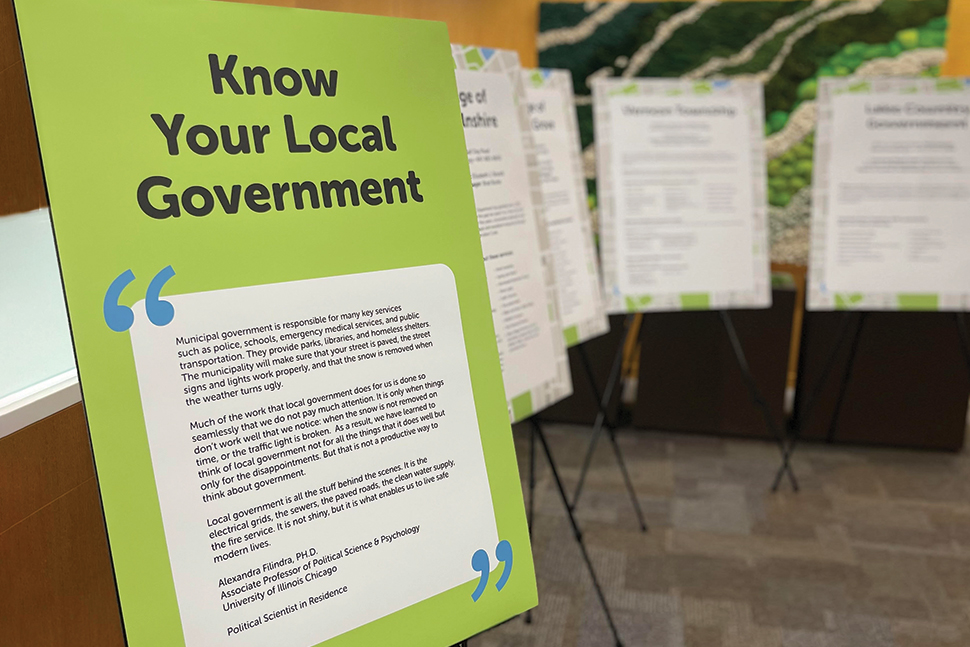The Political Scientist Is In

Noting the public’s eroding faith in the election process and its growing mistrust of many information sources, staffers at Vernon Area Public Library District (VAPLD) in Lincolnshire, Illinois, realized the library could help.
The Pew Research Center has found that eight in 10 Americans trust libraries to help them find reliable facts, and that a majority of Americans believe libraries help them get information to aid in decision making.
To build on that trust, VAPLD retained a political scientist in residence—a nonpartisan, university-level subject matter expert—to educate and inform voters throughout the 2024 election cycle.
In a healthy democracy, voters have confidence in the electoral process, are well informed about the issues, and know that their voice matters. Unfortunately, rampant misinformation and disinformation have left voters unhappy and confused these days about what to believe and whom to trust.
As information professionals, we know the library can make a difference. Providing a space for civic engagement is an important part of what public libraries do. To that end, the community engagement team at Vernon Area Public Library District (VAPLD) in Lincolnshire, Illinois, retained a political scientist in residence as a key component of a yearlong series of election-related offerings. This approach was inspired by similar programs at other libraries, such as the naturalist in residence at Madison (Wis.) Public Library.
After interviewing several professors at nearby universities, we ultimately connected with Alexandra Filindra in summer 2023. Filindra is an associate professor at University of Illinois Chicago who holds a PhD in political science. We were drawn to her experience and research in political psychology, specifically her insights about why people make the choices they make. We contracted with her to provide lectures, recommended reading, and other interactions with patrons over the course of 2024 in exchange for a stipend.
In January, Filindra gave a lecture at the library on the primary and caucus process. We also offered related activities to help boost civic engagement and prepare patrons for voting. For example, we invited staff from the county clerk’s office to VAPLD to demonstrate new election equipment, so that prospective voters could feel confident about the integrity of the election process.
Inspired by Filindra’s research, we also worked with municipal leaders to create a self-guided exhibit in the library titled Know Your Local Government. The exhibit helped residents discover and connect with services provided by the village, township, and county. An interactive component, “Why I Love My Community,” helped remind patrons of the infrastructure and public services that enrich our lives.
All respondents said the program taught them something new, and 83% of them agreed with the statement ‘I feel that my library is a safe place to discuss civics.’
In October, content focused on the Democratic and Republican party conventions, political decision making, and the integrity of the election process. For high school students voting in their first-ever presidential election, an election trivia program reinforced important information in a fun and engaging way (and offered students credit toward civic participation assignments for college-prep government classes). For adults, a lecture from Filindra on election integrity and current affairs highlighted the policies that safeguard our elections and covered late-breaking developments in the presidential campaigns.
The series concluded with a live, interactive virtual town hall, which provided a final opportunity for participants to ask Filindra any remaining election-related questions they had.
Patrons have told us our political programs were timely, thought-provoking, and engaging. When we surveyed attendees of an August program on the psychology behind political decisions, all respondents said the program taught them something new, and 83% of them agreed with the statement “I feel that my library is a safe place to discuss civics.”
While professional residencies aren’t new for libraries, they are rare, and their novelty attracts media attention. When we introduced the series at the start of the year, our regional newspaper ran a front-page story about it. Likewise, when we shared Filindra’s answers to patrons’ questions about the primary ballot in a press release, the paper again picked that up and ran it on the front page.
Another bonus of having a subject matter expert on retainer was the ability to quickly and authoritatively address the situations that none of us had on our bingo card. When presumptive Democratic candidate President Joe Biden withdrew from the race, for example, we knew we could turn to Filindra to provide answers about the process and historical context. We were able to seamlessly provide information from a trusted voice without having to scramble to find a new source.
Source of Article